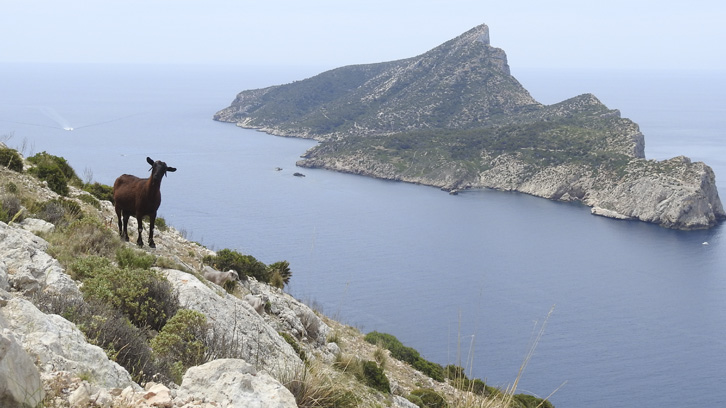Goats in the Mediterranean islands, more beneficial than damaging to the territory

After millennia of coexistence between humans and goats on the Mediterranean islands, the role of these animals is a source of controversy nowadays. A new publication has revised the benefits of goats in this ecosystem. The work calls for caution regarding certain possible practices, such as eradication, and emphasizes the importance of recognizing their ecosystem roles in environmental preservation.
Many studies have shown that goats introduced by man to oceanic islands behave like invaders, causing great damage to island ecosystems. The management of this problem is usually expensive in terms of time and money, as it is based on the eradication of these animals. The first islands where man introduced goats were those in the Mediterranean, a few thousand years ago. By extension, these islands are often considered to be overrun by feral goats, descendants of domestic goats, which threaten landscapes, endemic plants, and reforestation.
But these islands are not oceanic, and it must be considered that for a long time they were the habitat of several large herbivores in pre-human times (deer, elephants, and others) and their ecosystems evolved with them until they became extinct, coinciding with the arrival of man and his herds. This allows us to assume that these island ecosystems would be pre-adapted to the presence of large herbivores and that the goat would replace, at least in part, their role. In this work, a bibliographic review is made on the benefits of goats in the Mediterranean islands.
Goats have offered resources to man such as meat, milk, or leather, and have diversified over time. The islands have acted as a reservoir for many native breeds, which contribute to the genetic diversity of the species. Goats also help to maintain landscape heterogeneity and plant diversity, because the disturbance represented by the pasture leads to resistance strategies in the plants. They also contribute to the prevention of forest fires, reducing the fuel that accumulates in the undergrowth. On the other hand, they benefit other species, either by dispersing seeds, fertilizing the soil, or serving as food for birds of prey. In addition, it should also be noted that they participate in the maintenance of the tolerance of endemic plants to herbivory because many of the endemic species of the Mediterranean islands have some type of adaptation to herbivory.
Finally, it should be mentioned that, aside from the ecological and livestock interest, goats are also protagonists of some traditions, such as hunting with a dog and a lasso that is practiced in Mallorca, and which represents one of the few types of hunting that it does not necessarily lead to the death of the animal. The conclusion of this review is not only a call for caution in the application of certain actions, such as eradication, but also for the recognition of certain ecosystem functions specific to herbivores.
Department of Animal and Food Science
Universitat Autònoma de Barcelona
References
Bartolomé, Jordi and Seguí, Bartomeu. 2024. Potential Benefits of Mammalian Herbivores on Insular Systems: The Case of Goats on Mediterranean Islands. In: Moreira, X., Abdala-Roberts, L. (eds) Ecology and Evolution of Plant-Herbivore Interactions on Islands. Ecological Studies, vol 249. Springer, Cham. https://doi.org/10.1007/978-3-031-47814-7_7

